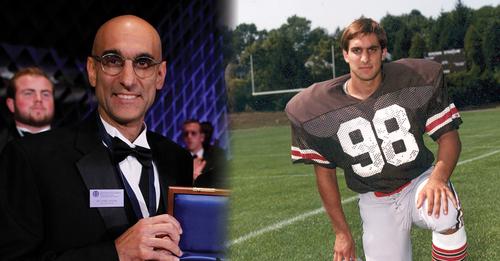INDIANAPOLIS, Ind. – Dr. Tom Catena, a former All-American football player and mechanical engineering major at Brown, developed a sense of service in his collegiate years. It wasn’t until he was driving home from his aunt’s funeral shortly after he graduated in 1986, however, that he realized that his call to help others would come in the field of medicine, not engineering.
Catena realized his desire to do mission-based work better aligned with his passion for science and working with people daily. He now realizes that his path to his current work was the route all along.
“(Brown) exposed me to a lot of different ways of thinking. It kind of opened all these possibilities,” Catena said. “I started thinking maybe I shouldn’t follow a standard path. The possibility of doing something different was there.”
Catena’s path led him to a life of medical mission service, including 15 years in Sudan, where he’s saved countless lives.
For his work, Catena will be awarded the 2024 NCAA Theodore Roosevelt Award on Wednesday, Jan. 10, at the NCAA Convention Welcome and Awards Presentation. This award is presented annually to a distinguished citizen of national reputation and outstanding accomplishment who graduated from an NCAA member institution and earned a varsity athletics award or participated in competitive intercollegiate athletics. Awardees exemplify the ideals to which collegiate athletics programs and amateur sports competitions are dedicated through their personal example and societal contributions.
A Duke University School of Medicine graduate, Catena embarked on his journey of purpose work with the Navy and spent four years as a flight surgeon. His next career evolution came during his residency, where he took his first mission trips to Guyana and Honduras. That solidified his destiny to make medical mission work his career. After he completed his residency in 1999, he began a seven-year mission in rural Nairobi, Kenya, where the plight of residents and the impact of his work set the foundation for his next venture.
After flights and a multiday drive through difficult terrain, Catena arrived in the Nuba Mountains in Sudan in 2008 and opened a hospital for the region’s 750,000 residents. Despite having few humanitarian resources, Catena has spent 15 years of medical service as the only permanent surgeon based in the region, which has been wracked by political conflict.
As medical director and head doctor and surgeon at Mother of Mercy Hospital in Gidel, he can see as many as 350 patients a day and oversees a 435-bed hospital.
“I kept hearing about Sudan,” Catena said. “People were saying, ‘If you think Kenya is difficult and challenging, you should work in Sudan if you really want a big challenge.’ And I thought, man, that’s a place I want to go to.”
Catena rose to the challenge when the opportunity presented itself to do so during the peak of a civil war. His call to take challenges head on parallels his experience as a college football player. His position as a noseguard required similar necessities of consistent hard work, while lessons of persevering through adversity as a team has paid lifelong dividends.
“There are direct correlations between a sport and the life I certainly experience here in the Nuba Mountains.” Catena said. “We’ve had multiple times when I was the only doctor here. … There’d be 100 wounded (soldiers) come in during the middle of the night, and I, along with my small team, would have to get through all those patients and be up all night working.”
Catena’s work has been recognized several times in recent years. He won the 2017 Aurora Prize for Awakening Humanity, earned the 2018 Catholics in Media Associates Social Justice Award and the 2020 Gerson L’Chaim Prize for “outstanding Christian medical missionary service.” The New York Times and Los Angeles Times are just a few notable outlets to highlight the impact of Catena’s efforts.
Crediting his “see it through” mindset to the game of football, Catena is thrilled at how the potential of increased visibility of Sudan’s plight and current isolated state can aid in his goals for his home. From opening a medical school to expanding clinical reach, Catena is committed to enhancing the trajectory of Sudanese medical services.
“My goal in years to come is that I can walk away, and we will have a fully trained, local Nuba staff,” he said. “We would have gone from not a single high school graduate to a full medical staff of local, trained professionals.”
Read More





